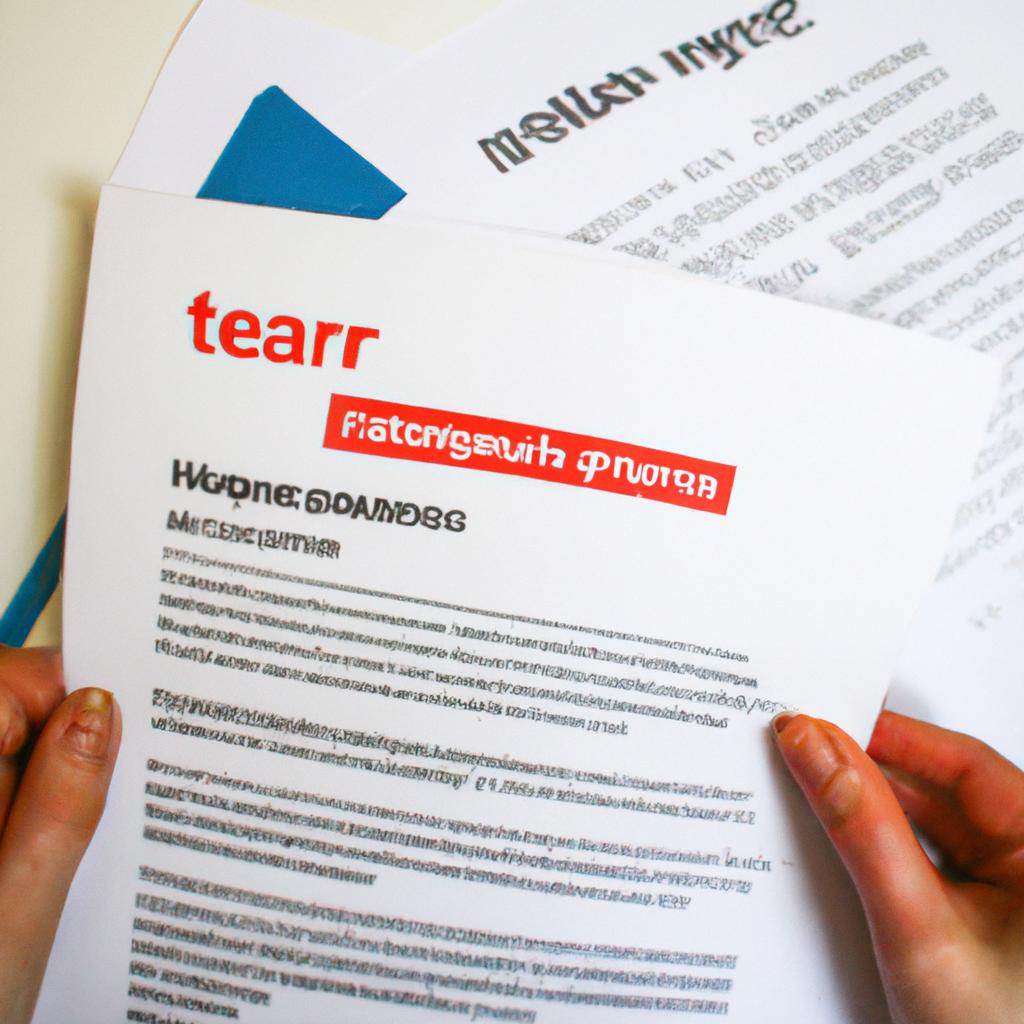Tenant Screening and Selection: Key Strategies for Real Estate Property Management
Tenant screening and selection is a crucial aspect of real estate property management, as it directly impacts the profitability and success of rental properties. Ensuring that tenants are reliable, responsible, and financially stable is essential for minimizing risks associated with late payments, property damage, or lease violations. For instance, consider a hypothetical scenario in which a property manager fails to adequately screen potential tenants and ends up renting to individuals with poor credit history and prior eviction records. This negligence can lead to lost income due to unpaid rent, increased expenses for repairs, and legal complications arising from unruly behavior.
To avoid such detrimental outcomes, property managers need effective strategies for tenant screening and selection. The process typically involves thorough evaluation of applicants’ background information, employment status, financial stability, rental history, and references. By conducting comprehensive screenings using these criteria and adhering to fair housing laws, property managers can identify qualified candidates who are likely to be responsible tenants.
This article aims to explore key strategies for tenant screening and selection in real estate property management. It will discuss various methods for obtaining accurate applicant information through background checks, credit reports, employment verification procedures, reference checks, and interviews. Additionally, the article will highlight the importance of clear communication throughout the application process while emphasizing the ethical responsibilities of property managers to treat all applicants fairly and equally.
One important strategy for tenant screening is conducting thorough background checks. This involves verifying an applicant’s identity, checking criminal records, and searching for any prior eviction history. Background checks can be performed through reputable screening companies or by manually contacting relevant authorities and conducting online searches.
Credit reports provide valuable insights into an applicant’s financial stability and ability to pay rent on time. Property managers should obtain written consent from applicants to access their credit reports and carefully review the information provided. It is crucial to look for red flags such as a history of late payments, high levels of debt, or outstanding judgments.
Employment verification procedures are essential in assessing an applicant’s income stability. Property managers should contact employers directly to confirm employment status, position held, and monthly income. It is also recommended to request recent pay stubs or tax returns as supporting documentation.
Checking references from previous landlords allows property managers to gain insight into an applicant’s rental history, behavior, and reliability. Contacting former landlords enables property managers to ask specific questions about the applicant’s payment history, lease compliance, and any issues encountered during their tenancy.
In-person or virtual interviews with potential tenants offer an opportunity for property managers to assess their communication skills, demeanor, and suitability as responsible occupants. Interviews allow property managers to ask additional questions regarding the applicant’s lifestyle preferences, expectations, and plans for renting the property.
Clear communication throughout the application process is vital in setting expectations for both parties involved. Property managers should clearly outline the requirements for rental applications in terms of documentation needed (such as identification papers or proof of income) and explain the timeline for processing applications. This helps ensure that all applicants are aware of what is expected from them while minimizing misunderstandings.
Finally, it is crucial for property managers to adhere to fair housing laws throughout the tenant screening process. These laws prohibit discrimination based on factors such as race, color, religion, sex, national origin, familial status, or disability. Property managers should treat all applicants equally and fairly, applying consistent screening criteria to avoid any potential legal complications.
In conclusion, tenant screening and selection are vital aspects of real estate property management. By implementing effective strategies such as thorough background checks, credit reports analysis, employment verification procedures, reference checks, and interviews, property managers can identify reliable and responsible tenants. Clear communication throughout the application process and adherence to fair housing laws further contribute to successful tenant screening and selection.
Understanding the Importance of Tenant Screening
Tenant screening is a crucial process in real estate property management that aims to identify and select qualified tenants for rental properties. By thoroughly assessing potential tenants, property managers can mitigate risks, protect their investments, and ensure a harmonious living environment for all residents. To illustrate the significance of tenant screening, consider the case study below:
Imagine a fictional property management company called “ABC Properties” that owns several apartment complexes across different cities. One day, they receive an application from a prospective tenant named John Doe who seems like an ideal candidate on paper: he has a stable job, good credit history, and no prior evictions. However, upon conducting thorough background checks and verifying references, ABC Properties discovers that Mr. Doe had previously caused significant damage to his previous rental unit and left owing months’ worth of rent.
This example highlights how proper tenant screening practices could potentially save property owners from financial losses and legal complications associated with problem tenants. In addition to avoiding such situations, there are several other compelling reasons why comprehensive tenant screening should be prioritized:
- Minimizing Property Damage: A well-executed screening process allows property managers to identify individuals with a history of damaging rental units or failing to maintain them properly.
- Ensuring Timely Rent Payments: Through screenings involving income verification and credit checks, landlords can assess whether applicants have a track record of meeting financial obligations promptly.
- Promoting Safety Within the Community: Thoroughly examining criminal records helps prevent leasing properties to individuals with violent tendencies or those engaged in illegal activities.
- Preserving Positive Tenant Relations: Selecting responsible and respectful tenants fosters a sense of community among residents by ensuring peaceful coexistence within the complex.
| Risks Associated With Poor Tenant Screening | Consequences |
|---|---|
| High likelihood of unpaid rent | Financial loss for property owners |
| Increased risk of property damage | Legal disputes and repairs costs |
| Potential for disruptive or dangerous neighbors | Decreased quality of life for residents |
| Difficulty in evicting problem tenants | Lengthy legal processes and expenses |
By recognizing the significance of tenant screening, property managers can take proactive steps to establish a reliable process that safeguards their investments and ensures a positive living environment. In the subsequent section, we will explore one such step: setting clear rental criteria.
With an understanding of why tenant screening is crucial, it becomes evident that establishing clear rental criteria is fundamental in attracting and selecting suitable tenants.
Setting Clear Rental Criteria
Building on the understanding of the importance of tenant screening, property managers can now focus on implementing effective processes to ensure the selection of reliable and responsible tenants. To illustrate this, let’s consider an example where a property management company implemented robust tenant screening strategies that resulted in reduced late payments and property damages.
Case Study Example:
A property management company noticed a significant increase in rental income losses due to late payments and extensive repairs caused by irresponsible tenants. In response, they decided to enhance their tenant screening procedures to mitigate these issues. By incorporating comprehensive background checks, credit assessments, and reference verifications into their process, they were able to identify potential red flags early on and select more qualified applicants for their properties.
To further emphasize the significance of implementing effective tenant screening practices, here are some key strategies:
-
Thorough Background Checks:
- Verify identity through government-issued identification
- Conduct criminal record searches
- Assess eviction history from previous landlords
-
Credit Assessments:
- Evaluate credit scores and payment histories
- Identify any outstanding debts or financial instability
-
Reference Verifications:
- Contact previous landlords for feedback on rent payment adherence and conduct as a tenant
- Reach out to personal references provided by applicants for additional insights
-
Interview Process:
- Engage with prospective tenants through interviews to assess communication skills, responsiveness, and overall suitability for tenancy.
These strategies create a structured framework that helps property managers make informed decisions when selecting tenants who align with their rental criteria.
Incorporating these approaches into your tenant screening process will significantly reduce the risk of problematic renters while promoting a positive rental experience for both parties involved. With well-documented procedures in place, property managers can confidently proceed towards advertising and attracting quality tenants who meet their requirements without compromising on efficiency or integrity.
Moving forward to the next section about “Advertising and Attracting Quality Tenants,” property managers can utilize these effective tenant screening practices to ensure they attract the most suitable candidates for their rental properties.
Advertising and Attracting Quality Tenants
Having established clear rental criteria, the next crucial step in tenant screening and selection is to effectively advertise your property. By employing strategies that attract quality tenants, you can ensure a pool of applicants who align with your requirements.
Paragraph 1:
To illustrate the impact of effective advertising, let’s consider a hypothetical scenario. Imagine you own a residential property in a desirable neighborhood, featuring modern amenities and convenient access to transportation. To attract potential tenants who value these attributes, it is imperative to craft compelling advertisements that highlight these unique selling points. By showcasing appealing images, emphasizing key features such as spacious living areas or updated kitchen appliances, and providing detailed information about nearby amenities like schools or shopping centers, your advertisement will capture the attention of qualified individuals seeking precisely what your property offers.
- Use catchy headlines and descriptive language to make your listing stand out.
- Consider utilizing online platforms and social media channels for wider reach.
- Clearly state any specific requirements or restrictions to discourage unqualified applicants.
- Include contact information and encourage interested parties to schedule viewings promptly.
Paragraph 2:
In addition to crafting an engaging advertisement, diversifying its placement across different mediums can significantly improve visibility among prospective tenants. With the majority of people now relying on online resources during their search for rental properties, leveraging popular real estate websites and local classifieds increases exposure exponentially. Moreover, incorporating targeted keywords relevant to your property’s location and specifications helps optimize search engine results, increasing the likelihood of attracting suitable candidates.
| Medium | Pros | Cons |
|---|---|---|
| Online Listings | Wide audience reach | High competition |
| Local Classifieds | Targeted local audience | Limited space for description |
| Social Media | Potential viral sharing | Difficulty targeting specific demographics |
Paragraph 3:
By effectively advertising your property, you not only attract a larger pool of potential tenants but also increase the chances of finding those who truly meet your rental criteria. Subsequently, this reduces the time and effort spent on screening unqualified applicants, allowing you to focus on conducting thorough background checks promptly. In the subsequent section about “Conducting Thorough Background Checks,” we will explore how to gather essential information that ensures informed decision-making for successful tenant selection.
With an influx of interested candidates resulting from effective advertising strategies, it is imperative to conduct thorough background checks before finalizing any rental agreements. By delving into prospective tenants’ history and ensuring their suitability as responsible occupants, property managers can maintain a secure and harmonious living environment for all residents.
Conducting Thorough Background Checks
Transitioning from the previous section on advertising and attracting quality tenants, property managers must now shift their focus to conducting thorough background checks. While effective marketing strategies can attract a pool of potential renters, it is vital for property owners and managers to carefully screen applicants before making final selections. To illustrate the importance of this process, consider the following hypothetical scenario:
Imagine a property manager who recently advertised an apartment for rent in a high-demand location. The listing received numerous inquiries, resulting in an overwhelming number of applications. In order to ensure they select reliable and responsible tenants, the property manager must implement comprehensive screening procedures.
To conduct thorough background checks effectively, property managers should adhere to several key strategies:
- Verification of identity: Confirming that applicants are who they claim to be by requesting identification documents such as driver’s licenses or passports.
- Employment verification: Contacting employers directly or using specialized services to verify applicants’ employment status and income stability.
- Rental history review: Checking with previous landlords about rental payment behavior, cleanliness habits, and any instances of lease violations.
- Credit check analysis: Obtaining authorization from applicants to run credit reports in order to assess their financial responsibility.
By implementing these strategies consistently throughout the tenant selection process, property managers can minimize risks associated with problematic tenants while maximizing the chances of finding individuals who will be respectful occupants within their properties.
| Key Strategies for Background Checks | Emotional Impact |
|---|---|
| Verification of Identity | Security |
| Employment Verification | Stability |
| Rental History Review | Trustworthiness |
| Credit Check Analysis | Financial Health |
In summary, ensuring a rigorous background check process is essential when selecting tenants for rental properties. By verifying identities, confirming employment information, reviewing rental histories, and analyzing credit reports diligently, property managers can make informed decisions that promote security and stability within their real estate investments. With these checks completed successfully, we can move forward to the next step of verifying tenant references, further solidifying our understanding of potential tenants’ suitability for our properties.
Verifying Tenant References
Having conducted thorough background checks on prospective tenants, property managers must now move forward with verifying tenant references. This crucial step in the tenant screening process helps property managers gain insights into a potential tenant’s rental history and behavior. By contacting previous landlords or property management companies, they can obtain valuable information regarding payment consistency, adherence to lease agreements, and overall suitability as a tenant.
Example:
To illustrate the importance of verifying tenant references, consider the case of John Doe, a prospective tenant for an apartment complex managed by XYZ Property Management Company. During the background check phase, it was discovered that he had previously rented an apartment from ABC Property Management Company. The verification process involved reaching out to ABC Property Management Company to inquire about his tenancy experience.
Paragraph 1:
Verifying tenant references serves several purposes in ensuring responsible tenancy. Firstly, it allows property managers to confirm whether applicants have been truthful about their past rental experiences. By assessing the credibility of provided references against actual landlord feedback, property managers can gauge an applicant’s honesty and integrity throughout the application process. Additionally, this step assists in evaluating a potential tenant’s ability to consistently pay rent on time and fulfill lease obligations.
- Provides insight into a potential tenant’s reliability and trustworthiness.
- Helps determine if there were any issues related to noise complaints or neighbor disputes.
- Assists in identifying patterns of late payments or non-payment.
- Enables property managers to assess if tenants left previous rentals in good condition.
Paragraph 2:
Through direct communication with previous landlords or property management companies, vital information can be gathered through structured questions tailored towards understanding an applicant’s rental history thoroughly. These discussions may include inquiries about rent payment timeliness, adherence to lease terms, cleanliness habits demonstrated during inspections, and any significant incidents or conflicts that occurred while renting.
Table (3 columns x 4 rows):
| Concerns or Issues | Tenant 1 | Tenant 2 | Tenant 3 |
|---|---|---|---|
| Late Payments | No | Yes | No |
| Lease Violations | No | Yes | Yes |
| Neighboring Disputes | No | No | Yes |
| Property Damage | Minimal | Moderate | None |
Paragraph 3:
Verifying tenant references not only provides valuable insights into an applicant’s suitability but also helps property managers make informed decisions based on concrete evidence. By carefully analyzing the information gathered during this process, property managers can mitigate potential risks and ensure a positive experience for both tenants and landlords alike. In the subsequent section, we will explore another essential tool in the tenant screening process: using a tenant screening checklist to streamline procedures.
Transition sentence to the next section about “Using a Tenant Screening Checklist”:
With verified references in hand, property managers can now proceed to effectively utilize a comprehensive tenant screening checklist that covers various critical aspects of evaluating prospective tenants’ eligibility.
Using a Tenant Screening Checklist
After gathering potential tenant applications and conducting initial screenings, the next crucial step in the tenant selection process is verifying tenant references. This step allows property managers to gain insight into a prospective tenant’s rental history and behavior, helping them make informed decisions about who will be the best fit for their rental property.
To understand how this process works, let’s consider an example: Suppose a property manager receives an application from John Smith, who claims to have rented an apartment for the past two years. As part of verifying tenant references, the property manager would reach out to John’s previous landlord(s) to confirm his tenancy, payment history, and overall conduct as a renter. By doing so, they can assess whether John has been responsible with his obligations and if he is likely to be a reliable tenant.
During the verification process, there are several key strategies that can be employed:
-
Contacting Previous Landlords: Property managers should proactively reach out to former landlords listed by applicants on their rental applications. This enables them to gather first-hand information about the applicant’s reliability in paying rent on time, taking care of the property, and adhering to lease agreements.
-
Employment Verification: Verifying a prospective tenant’s employment status ensures that they have a stable source of income necessary for timely rent payments. A simple call or email to their employer can provide valuable insights into their job stability and ability to meet financial obligations.
-
Personal References: Alongside contacting previous landlords and employers, reaching out to personal references provided by applicants adds another layer of credibility assessment. Speaking with individuals who know the applicant personally can shed light on their character traits such as responsibility, honesty, and communication skills.
-
Online Research: In today’s digital age, online research plays an essential role in reference verification. Checking social media profiles or conducting basic internet searches may uncover additional information about applicants that could impact their eligibility as tenants.
To bring clarity to the key strategies mentioned above, here is a table summarizing their significance in the tenant screening process:
| Strategy | Significance |
|---|---|
| Contacting Landlords | Provides valuable information about an applicant’s rental history and behavior. |
| Employment Verification | Ensures tenants have a stable source of income for rent payment purposes. |
| Personal References | Offers insights into an applicant’s character traits and interpersonal skills. |
| Online Research | Helps property managers uncover additional information that might impact tenant eligibility or suitability. |
By diligently verifying tenant references using these strategies, property managers can make well-informed decisions when selecting tenants. The objective assessment of an applicant’s past behaviors and reliability enhances the chances of finding responsible individuals who will be respectful occupants of the rental property.



